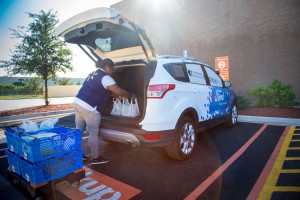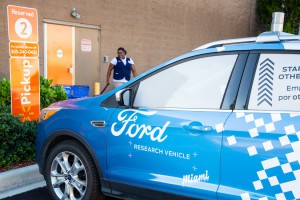
Through the collaboration with Walmart and Postmates, Ford is exploring how self-driving vehicles can deliver many groceries and other goods.
Ford continues to grow its mobility business, announcing a new partnership with Walmart to use autonomous vehicle to make deliveries to Walmart customers.
The automaker will partner with San Francisco-based Postmates, a delivery service company, to develop the delivery service initially using vehicles driven by people to deliver goods. Those initial delivery runs will help develop the routing for autonomous vehicles.
“Before self-driving cars can go mainstream, we must get a better sense of how people want to interact with them,” Tom Ward, Walmart senior vice president for digital operations, said in a statement on Thursday.
Right now, the company is using Ford Escapes for the service, which is being piloted in Miami. But Ford will look at developing purpose-built vehicles for self-driving vehicles in the future. Ford has said it expects to launch commercial production of automated vehicles by 2021.
(Skip the tip: Domino’s, Ford team up to test driverless pizza delivery. Click Here for the story.)
Ford could produce new designs or equipment for vehicles, wrote Brian Wolf, Director, Business Development, Ford Autonomous Vehicles LLC, in a blog describing the new partnership with the retailing giant.

The deal calls for actual drivers to be used to develop the program with a switch to autonomous vehicles down the line.
Among the challenges Ford has said it is working on is designing on-board storage systems that are easy for customers to open to retrieve a pizza or a package. Last year, Ford began working with Domino’s Pizza on an autonomous vehicle that could deliver pizza.
Domino’s interest in driverless delivery should be no surprise. The vast majority of its sales – about 1 billion pizza pies annually – must be delivered to customers’ homes or offices. The second-largest pizza chain in the world, with global sales of around $10.9 billion in 2016, the company says its drivers clock about 10 million miles a week.
Even at minimum wage, the 100,000 drivers it uses in the U.S. alone weigh heavily on the company’s bottom line. The elimination of drivers is the primary, ahem, driver in the interest of companies like Domino’s, Uber, Lyft and others that currently need drivers for their businesses to work.
(Click Here for more about Kroger working with Nuro on a driverless delivery vehicle.)
In July, Ford said it would create a new business unit, Ford Autonomous Vehicles LLC, to develop its self-driving vehicle technologies and operations. The plan calls for an investment of $4 billion in the unit through 2023.

Ford is investing $4 billion into its Ford Autonomous Vehicles LLC to try to become the world's mobility leader.
Since then, the company has not only purchased Detroit’s former train station to physically house the employees who will take part in the newly formed entity, as well as several other nearby buildings, but it has purchased start-up companies with the hopes of hitting upon the right technologies to make it the leader in mobility.
Less than a week ago, Ford acquired Spin, an eScooter company with operations in 32 cities. Like Bird and Lime, the electric scooters can be seen buzzing around downtown areas, college campuses and other places providing quick, simple and cheap transport.
Ford has been an aggressive player in seeking out new mobility options, among other things investing heavily in autonomous driving technology. Sources say those efforts could be one of the topics being discussed between the Detroit automaker and Volkswagen as they explore a range of possible joint ventures.
(To see more about Ford’s discussions with Volkswagen, Click Here.)
Additionally, it’s engaged in substantive discussions with Volkswagen AG about how the two sides can link up. Initially, the companies were focused on commercial vehicles, but that has suddenly broadened quite a bit. According to various U.S. and European sources, these include joint development of a small pickup, cooperation on electrified and autonomous vehicles and possibly even collaboration on sales and marketing in trouble-spot markets, such as Europe and Latin America.
